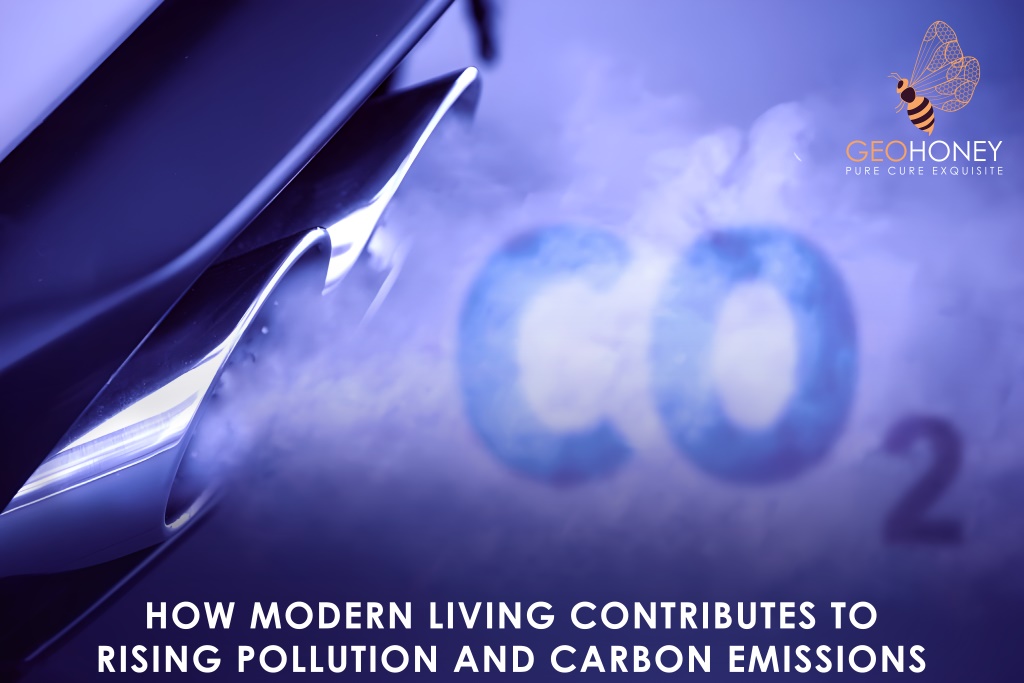- Tokyo: 08:42
- Singapore: 07:42
- Dubai: 03:42
- London: 23:42
- New York: 18:42
Climate Change: How Modern Living Contributes to Rising Pollution and Carbon Emissions

Because of human activity, the atmosphere, ocean, cryosphere, and biosphere have all warmed.
The 45th Globe Environment Day, held on June 5, 2023, with the topic of reducing plastic pollution, emphasizing the ongoing harmful impact of global warming and climate change, as well as the fact that the globe is in a state of climate emergency. If the aim of keeping global temperature rise below 2°C is not realized, the repercussions will be severe and possibly irreversible.
Climate change is a natural process in which temperature, rainfall, wind, and other components fluctuate over decades or longer. Our planet has been warming and cooling for millions of years. However, we are currently experiencing unusually rapid warming caused by human activities, particularly the combustion of fossil fuels, which emits greenhouse gases.
Because of human activity, the atmosphere, ocean, cryosphere, and biosphere have all warmed. The Earth has warmed by around 1.1°C since the 1800s. The five warmest years on record were 2015-2019, with 2010-2019 being the warmest decade on record.
"There is a 48% chance that the annual mean global temperature will temporarily exceed 1.5 °C above pre-industrial levels (1850-1900) for at least one of the next five years (2022-2026," according to the "United in Science 2022" report. Furthermore, there is a 93% chance that at least one of the following five years will be warmer than the warmest year on record (2016)."
People's daily lifestyle choices and actions contribute significantly to climate change. Many daily activities, such as transportation, energy consumption, and waste management, can produce greenhouse gases and carbon emissions, as well as contribute to pollution, which is the primary driver of climate change. Here are a couple of such examples:
Transportation: Using private automobiles, particularly those that operate on fossil fuels such as petrol and diesel, contributes to air pollution and carbon emissions. Using public transport, carpooling, cycling, or walking instead of driving can help cut pollution.
Energy consumption: The generation of electricity from fossil fuels such as coal and natural gas can result in large carbon emissions. Energy conservation, the use of energy-efficient appliances, and the transition to renewable energy sources such as solar or wind power can all help to minimize carbon footprints.
Improper trash disposal, such as burning waste, can discharge dangerous pollutants into the air, soil, and water. Pollution can be reduced by practicing proper waste management, such as recycling, composting, and reducing trash output.
Food choices: Because of variables like deforestation, methane emissions from animals, and transportation, the production of some foods, particularly meat and dairy products, can have a higher carbon footprint. Choosing plant-based diets or lowering meat intake can help reduce the carbon footprint of food production.
Consumption of goods and services can contribute to pollution and emissions throughout their lifecycle, including manufacture, transportation, and disposal. Consider sustainable and eco-friendly solutions, supporting environmentally conscious businesses, and cutting back on unnecessary purchases can all help.
While individual actions are important, reducing pollution and carbon emissions also necessitate systemic changes such as switching to cleaner energy sources, developing sustainable transportation systems, and enacting environmentally friendly laws and practices. Individual, community, and societal efforts must be coordinated to reduce the environmental impact of human activities.
Steps to combat climate change, pollution, and carbon footprints
Transportation:
When possible, take public transportation, carpool, bike, or walk.
Choose fuel-efficient automobiles or think about going electric or hybrid.
Reduce unnecessary air travel by taking trains or buses for shorter distances.
Consumption of energy:
Turn off lights and appliances when not in use to save electricity.
Change to energy-saving LED lights and appliances.
When feasible, employ natural sunlight and ventilation.
If possible, invest in alternative energy sources such as solar panels for dwellings.
Waste disposal:
Use the three Rs: Reduce, Reuse, and Recycle.
Avoid single-use plastics and needless packaging to reduce waste generation.
Separate recyclable materials and properly dispose of them.
Compost organic waste to reduce methane emissions from landfills.
Environmentally friendly food options:
Reduce transportation emissions by eating locally sourced and seasonal foods.
Reduce your meat consumption or switch to a plant-based diet, as the meat business has a large environmental impact.
Encourage organic and sustainable farming practices.
Conservation of water:
Fix leaks, use water-efficient fixtures, and practice careful water usage to save water.
Collect rainwater for gardening or non-drinking purposes.
Consumption with a conscience:
Prioritize long-lasting and high-quality items over disposable or short-lived items.
Companies and brands that prioritize sustainability and environmental responsibility should be supported.
Reduce unnecessary purchases and look into used possibilities.
Education and advocacy:
Keep up to date on environmental concerns and share your expertise with others.
Encourage policies and efforts that enhance environmental sustainability and protection.
Encourage community participation and collaborative effort for a better environment.
Individual efforts alone will not solve the climate change problem, but they will help to contribute to a larger community effort. To effectively fight pollution, it is critical to advocate for systemic reforms, support sustainable practices, and participate in community projects.
Lions Clubs International implements a variety of projects, including rainwater harvesting, setting up RO plants, providing energy-efficient stoves in rural India, planting trees, building check dams, maintaining parks and gardens, and cleaning up beaches and lakes, with the clear conviction that sustainability protects and restores our environment to improve the well-being of all communities. LCIF (Lions Clubs International Foundation) awarded three environment-related grants totaling US$111,500 from July to August 2022."
Source: financialexpress.com




The primary cause of this rising pollution is those factories or the biggest companies that give off too much carbon that destroys the ozone layer, and pollution to the air we breathe in.
Because nowadays, we are living in a generation wherein, wherever we go, whatever we do, we are surrounded by machines and technologies, in which we rely on them too much, not knowing that there's an effect on our environment, on us especially.